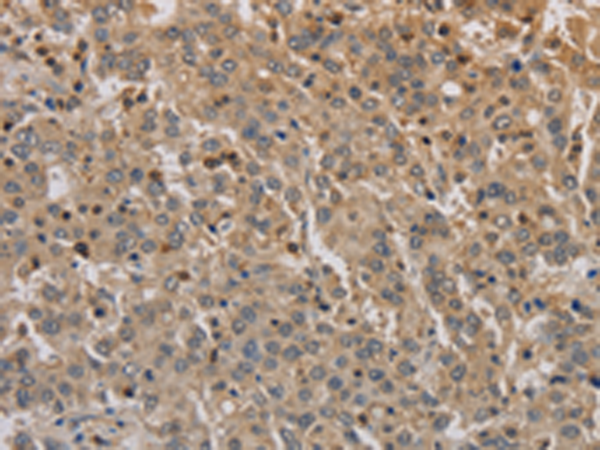

| WB | 咨询技术 | Human,Mouse,Rat |
| IF | 咨询技术 | Human,Mouse,Rat |
| IHC | 1/25-1/100 | Human,Mouse,Rat |
| ICC | 技术咨询 | Human,Mouse,Rat |
| FCM | 咨询技术 | Human,Mouse,Rat |
| Elisa | 1/1000-1/10000 | Human,Mouse,Rat |
| Aliases | C10orf22 |
| WB Predicted band size | 30 kDa |
| Host/Isotype | Rabbit IgG |
| Antibody Type | Primary antibody |
| Storage | Store at 4°C short term. Aliquot and store at -20°C long term. Avoid freeze/thaw cycles. |
| Species Reactivity | Human, Mouse |
| Immunogen | Synthetic peptide of human ADO |
| Formulation | Purified antibody in PBS with 0.05% sodium azide and 50% glycerol. |
+ +
以下是关于抗DNA抗体(ADO抗体)的3篇参考文献及其简要摘要:
1. **"Anti-DNA antibodies in the pathogenesis of systemic lupus erythematosus"**
*作者:Shlomchik, M.J. et al.*
**摘要**:探讨抗DNA抗体在系统性红斑狼疮(SLE)中的致病机制,指出其通过形成免疫复合物沉积于肾脏等器官,激活补体系统,导致炎症和组织损伤。
2. **"Clinical significance and detection of anti-DNA antibodies: Advances in diagnostic assays"**
*作者:Smolen, J.S. & Steiner, G.*
**摘要**:比较不同检测方法(如ELISA、Farr法)的敏感性和特异性,强调高亲和力抗DNA抗体对SLE诊断的特异性,及其在监测疾病活动中的应用。
3. **"Anti-DNA antibodies and disease activity in lupus nephritis"**
*作者:Tsokos, G.C. et al.*
**摘要**:通过纵向研究证明抗DNA抗体水平与SLE患者肾脏损伤程度及疾病活动度正相关,提示其作为治疗反应和预后的生物标志物潜力。
4. **"Therapeutic targeting of anti-DNA antibodies in SLE"**
*作者:van Vollenhoven, R.F. & Furie, R.A.*
**摘要**:综述针对抗DNA抗体的新型疗法(如B细胞耗竭、免疫耐受诱导),评估生物制剂在降低抗体滴度、改善患者预后中的作用。
注:ADO抗体在文献中通常指抗双链DNA(dsDNA)抗体,是SLE的核心生物标志物。以上研究覆盖其机制、检测、临床意义及治疗方向。
**Background of Anti-ADO Antibodies**
Anti-adenosine deaminase (ADO) antibodies target adenosine deaminase (ADA), an enzyme critical in purine metabolism. ADA catalyzes the irreversible deamination of adenosine and deoxyadenosine to inosine and deoxyinosine, preventing toxic metabolite accumulation. In humans, ADA deficiency causes severe combined immunodeficiency (SCID) due to impaired lymphocyte development and function.
ADO antibodies are primarily studied in autoimmune and inflammatory contexts. In autoimmune disorders like rheumatoid arthritis (RA) or systemic lupus erythematosus (SLE), ADA activity may be altered, and autoantibodies against ADA have been detected, though their clinical significance remains unclear. Some studies suggest these antibodies could modulate extracellular adenosine levels, influencing immune responses or tissue inflammation.
In diagnostics, anti-ADO antibodies are not routinely measured but may serve as biomarkers in specific research settings. For example, elevated ADA levels or autoantibodies have been observed in tuberculosis pleural effusions or certain cancers, linking ADA dysregulation to disease pathology.
Therapeutic approaches targeting ADA, such as enzyme replacement or gene therapy for SCID, avoid immune responses by using polyethylene glycol-modified ADA (PEG-ADA) or patient-specific gene corrections. However, anti-ADO antibodies in non-SCID contexts remain understudied, warranting further exploration of their roles in autoimmunity, inflammation, and metabolic disorders. Challenges include standardizing detection methods and clarifying their pathogenic or protective mechanisms.
×